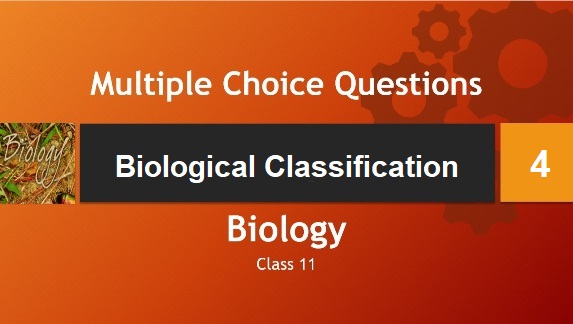CBSE Class 11 Chemistry Chapter 2 Biology Biological Classification Multiple Choice Questions with Answers. MCQ Questions Class 11 Biology Biological Classification with Answers was Prepared Based on Latest Exam Pattern. Students can solve NCERT Class 11 Biology Biological Classification MCQs with Answers to know their preparation level.
Students who are searching for NCERT MCQ Questions for Class 11 Biology Biological Classification with Answers are compiled here to get good practice on all fundamentals. Know your preparation level on MCQ Questions for Class 11 Biology with Answers. You can also verify your answers from our provided MCQ Class 11 Biology Biological Classification with Answers. So, ace up your preparation with MCQ of Chapter 2 Biology Objective Questions.
MCQ Questions Class 11 Biology Biological Classification with Answers - Set - 4
Question 1:
Question. Choose the correct pair.
(a) Parasitic fungi – feeds on plants and animals
(b) Saprotrophic fungi – feeds on dead and decaying organic matter
(c) Symbiotic fungi – mycorrhiza
(d) All of the above are true
Correct Answer – (D)
Question 2 :
Question. Lichens indicate SO2 pollution because they
(a) show association between algae and fungi
(b) grow faster than others
(c) are sensitive to SO2
(d) flourish in SO2 rich environment.
Correct Answer – (C)
Question 3 :
Question. Single-celled eukaryotes are included in
(a) protista
(b) fungi
(c) archaea
(d) monera.
Correct Answer – (A)
Question 4 :
Question. Which one of the following is true for fungi?
(a) They lack a rigid cell wall.
(b) They are heterotrophs.
(c) They lack nuclear membrane.
(d) They are phagotrophs.
Correct Answer – (B)
Question 5 :
Question. Lichens are well known combination of an alga and a fungus where fungus has
(a) a saprophytic relationship with the alga
(b) an epiphytic relationship with the alga
(c) a parasitic relationship with alga
(d) a symbiotic relationship with alga.
Correct Answer – (D)
MCQ Questions Class 11 Biology Biological Classification with Answers
Question 6 :
Question. The two kingdom Classification was given by
(a) c.linnaeus
(b) john ray
(c) huxley
(d) whittaker
Correct Answer – (C)
Question 7 :
Question. Which one is the wrong pairing for the disease and its causal organism?
(a) Black rust of wheat-Puccinia graminis
(b) Loose smut of wheat-Ustilago nuda
(c) Root knot of vegetables-Meloidogyne sp.
(d) Late blight of potato-Alternaria solani
Correct Answer – (D)
Question 8 :
Question. What is the genetic material in influenza virus?
(a) Double helical DNA
(b) RNA
(c) Single helix DNA
(d) None of these
Correct Answer – (B)
Question 9 :
Question. Which of the following is a cyanobacterium ?
(a) Nostoc
(b) Chara
(c) E. coli
(d) Polysiphonia
Correct Answer – (A)
Question 10 :
Question. Which of the following statements is incorrect?
(a) Yeasts have filamentous bodies with long thread like hyphae.
(b) Morels and truffles are edible delicacies.
(c) Claviceps is a source of many alkaloids and LSD.
(d) Conidia are produced exogenously and ascospores endogenously.
Correct Answer – (A)
- NCERT Solutions Class 11 Chemistry Chapter 1 : Some Basic Concepts of Chemistry
- NCERT Solutions Class 11 Chemistry Chapter 2 : Structure Of The Atom
- NCERT Solutions Class 11 Chemistry Chapter 3 : Classification of Elements and Periodicity in Properties
- NCERT Solutions Class 11 Chemistry Chapter 4 : Chemical Bonding and Molecular Structure
- NCERT Solutions Class 11 Chemistry Chapter 5 : States of Matter
- NCERT Solutions Class 11 Chemistry Chapter 6 : Thermodynamics
- NCERT Solutions Class 11 Chemistry Chapter 7 : Equilibrium
- NCERT Solutions Class 11 Chemistry Chapter 8 : Redox Reactions
- NCERT Solutions Class 11 Chemistry Chapter 9 : Hydrogen
- NCERT Solutions Class 11 Chemistry Chapter 10 : The s-Block Elements
- NCERT Solutions Class 11 Chemistry Chapter 11 : The p-Block Elements
- NCERT Solutions Class 11 Chemistry Chapter 12 : Organic Chemistry: Some Basic Principles and Techniques
- NCERT Solutions Class 11 Chemistry Chapter 13 : Hydrocarbons
- NCERT Solutions Class 11 Chemistry Chapter 14 : Environmental Chemistry




